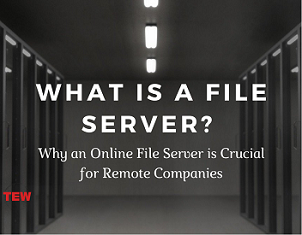What Is A File Server? Why An Online File Server Is Crucial For Remote Companies?
Companies with remote employees need a file sharing solution that can be accessible from any location. If users are working from coffee shop, from their bedroom, or out on road, they should be able to easily upload their files and share them with colleagues. Most people are familiar with cloud storage providers. That reduces the question, what is a file server
A file server is a more technical solution that gives greater control to a company. A file server provides the cloud storage model’s many benefits in a more familiar fashion. In this article, we’ll go over some simple explanations of the file server model. And how it differs from a cloud storage provider like Google Drive or Dropbox.
What makes a good file server?
For a dependable file server, the correct hardware is essential. Of course, this includes hard disk, which must have adequate space for data and applications, operating system and client software.
However, it is also important to have reliable file sharing server software that is easy to install and configure. The file server software must be able to provide a reliable file storage and retrieval system. It must also be able to provide the necessary security to prevent unauthorized access. the increasing amount of data that is being generated by the increasing number of applications.
Being able to control all server material, without any question, and a hosting firm cannot just pull the plug on you, delete your data, or otherwise affect your data integrity. More so if you are genuinely hosting a file server at your own premises or at a place.
What benefits does a file server offer?
Data Recovery
If you’ve been backing up your files on regular basis, you can retrieve all data using remote file server. This also enables you to access and transfer files between computers. It allows you to collaborate on documents at any time. Alternatively, you could use a hosting provider to store your files on their servers. Just remember to use regularly updated web server or virtual private server, so that you don’t require to continuously back up your files.
One of the most common reasons that companies worry about using a cloud service is that they’re not sure how much data they’re actually saving. And also about guarantee of their security.
You need to take the time to check if your provider is GDPR compliant or what the service’s backup policies are. Both of these will give you peace of mind.
In-house hosting gives you greater control over backup data
Any file you drag or copy into that folder gets mirrored onto a server somewhere on the Internet, just how shared documents are saved on an office network. Meanwhile, a background service on your computer or device synchronizes the contents of each folder with its Internet server replica on a regular basis. As a result, any changes you make to one version of the file will appear in all others.
Copies to the cloud, even small ones, are most useful when used to roll back faulty program to previous state. And also, when they can restore a corrupted file, or remove a virus. You should also be able to easily roll a file back to a previous version or version of a file, which is exactly the purpose of a checkpoint.
The benefit this offers companies looking to maintain backup servers in their data centers is simple. With your remote syncs, there is no need for a second copy of a file in your own secure data center. Rather, a company can maintain copies only of their own servers’ drives. The content that, from their perspective, is truly important, and then delete the other copies off of their servers when they complete backing them up.

Comments
Post a Comment